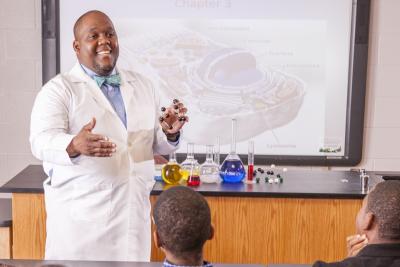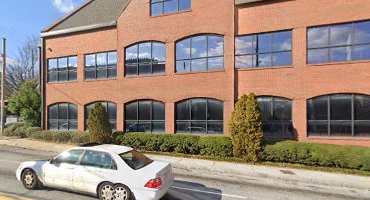May 24, 2016
College of Sciences basks in the reflected glow of a GIFTed science teacher
Casey M. Bethel, Georgia’s 2017 Teacher of the Year, has spent the past five summers doing research in the College of Sciences through the Georgia Intern Fellowships for Teachers (GIFT). This summer, he will return again to the lab of Raquel L. Lieberman, an associate professor in the School of Chemistry and Biochemistry.
An extraordinary science teacher and mentor at New Manchester High School, in Douglasville, Bethel personifies the power of university-school partnerships enabled by programs like GIFT to transform teaching and learning of science, technology, engineering, and mathematics (STEM), says Lizanne DeStefano. She is the executive director of the Center for Education Integrating Science, Mathematics, and Computing (CEISMC), the College of Sciences unit that administers the GIFT program.
“For 25 years, Georgia Tech’s GIFT program has been providing K-12 teachers with opportunities to participate in real-world applications in STEM fields, so that they can then pass along learnings and applications to students,” says Georgia Tech President G.P. “Bud” Peterson. “We are grateful for teachers like Casey Bethel whose commitment to STEM education is helping to prepare and inspire the next generation,” he says. President Peterson himself was a high school mathematics and science teacher early in his career.
The Lieberman group studies, among others, proteins associated with human diseases, such as glaucoma and Alzheimer’s disease. Protein crystallography, biochemical/physical characterization, and computer modeling are some of the methods the group uses to elucidate the structure and functions of disease-related proteins.
On the basis of Bethel’s education, professional experience, and interests, Lieberman thought Bethel would be a good match for her lab and actively recruited him to work with her. She adds that three years of Bethel’s participation in GIFT were supported by her National Science Foundation Faculty Early Career Development Program (CAREER) award.
Bethel says working in the Lieberman lab vastly improved his teaching and knowledge. The experience enabled him to better prepare his students for college-level courses. More than 50 of his former students have gone into STEM majors and careers, he says; some of them are students at Georgia Tech.
GIFT provides K-12 science and math teachers paid summer internships in research laboratories, where they participate in designing and conducting experiments, interpreting data, and communicating findings. Internships may also take place in industry, where teachers gain workplace experience and learn the skills needed for STEM careers. By working daily with researchers or in industry, teachers increase their content knowledge and find ways to enrich their teaching practices.
At New Manchester High School, Bethel teaches Advanced Placement (AP) Physics, AP Biology, Biology, and Physical Science. As a result of his research experience at Georgia Tech, Bethel, with Lieberman, designed a teaching unit comprising lessons centered on protein structures and their relation to function and disease.
Bethel and Lieberman describe the unit in The Journal of Chemical Education. “The lessons are designed … to make learning more relevant to daily life, and to help high school students engage in and understand advanced topics beyond the typical high school chemistry or biology curriculum,” they write.
Separately, Bethel is helping the advance of basic scientific knowledge. According to Lieberman, he is a coauthor of a scientific research paper that is undergoing peer review.
After having worked with Bethel for five consecutive summers, Lieberman is elated, but not too surprised, that he is now Georgia’s 2017 Teacher of the Year. “He is focused, committed, and passionate,” says Lieberman. “He loves to learn and has a no-nonsense attitude. He follows through on commitments and is highly professional.”
While Bethel was gaining knowledge and research experience from his GIFT internship at Georgia Tech, the Lieberman lab also was learning from him.
“Casey is a natural teacher,” says Lieberman. “He is able to explain complex issues to a broad audience,” a skill that many students struggle with, she notes.
“Casey is inspirational,” Lieberman adds. “Students pick up on his infectious enthusiasm and love of learning.”
As Georgia’s 2017 Teacher of the Year, Bethel will serve as ambassador for all Georgia public school teachers, school systems, and students; speak to various groups throughout the state; conduct staff development activities for other teachers; and represent Georgia in the 2017 National Teacher of the Year competition.
“Couldn’t be more proud of Casey,” Lieberman tweeted when the news broke on May 20.
“We are utterly delighted at Casey’s selection as Georgia’s Teacher of the Year,” says College of Sciences Dean Paul M. Goldbart. “Casey is an extraordinary representative of the K-12 community, inspiring Georgia Tech staff to learn more about high-school teaching and learning strategies as they work with him to support his innovative approaches to teaching.”
Casey Bethel, Georgia’s 2017 Teacher of the Year, Reflects on His Teaching Journey
What got you started in teaching science and the GIFT program?
I grew up in the Bahamas, in a family of teachers. I was told at an early age that because I performed well in science, I had to be a doctor or a scientist. I pursued those careers all the way to graduate school, earning a master's degree in plant genetics from the University of Georgia. However, the work never brought enough fulfillment.
On the other hand, I thoroughly enjoyed my experiences as a teaching assistant, instructing undergrads. In 2005, I tried teaching, in the DeKalb County School System, at first as a one-year experiment. I found my calling and never looked back.
After a few years of teaching, I hit a wall. I was unsatisfied with my students’ progress. A mentor of mine advertised the GIFT program as a means of broadening my background. I tried it, and I saw immediate results.
Dr. Lieberman welcomed me and made me a contributing member of her team. Every year since 2011, my wealth of knowledge has grown and my teaching practices have improved.
What does the Teacher of the Year award mean to you?
This award is a huge honor. It serves as validation of the hard work and sacrifices I have put into growing in this career. I hope that it further inspires my students to work hard and pursue their dreams.
What will you do with this award?
I hope to bring attention to some of the ways we can solve education’s greatest challenges.
It is becoming harder to recruit and retain talented teachers, especially in science and math. I am on a recruitment tour to attract some of the brightest science and math students to join the teaching profession. The challenge of educating the next generation of problem solvers and world leaders is just as important as the race to cure cancer. Teaching is the best way to make a difference.
At the same time, I hope to be an example of how collaboration between universities, industries, and K-12 educators can radically improve the way we teach and prepare students. My own teaching practices sky-rocketed since I formed a partnership with Dr. Lieberman and her research team. Working with them in the summers, I get to see how the concepts I teach in my high school classes are applied to authentic research. Such exposure provides the real-world connections that help me make science more relevant for my students. We need more of these collaborations in every content area.
What is the secret to your success as a teacher?
The secret is passion. When teachers are passionate about what they do, it translates to their students. Effective teachers are excited to share what they know in a way that draws students in, making them see the value of knowledge. My students and I have a saying, “Information is currency.”




